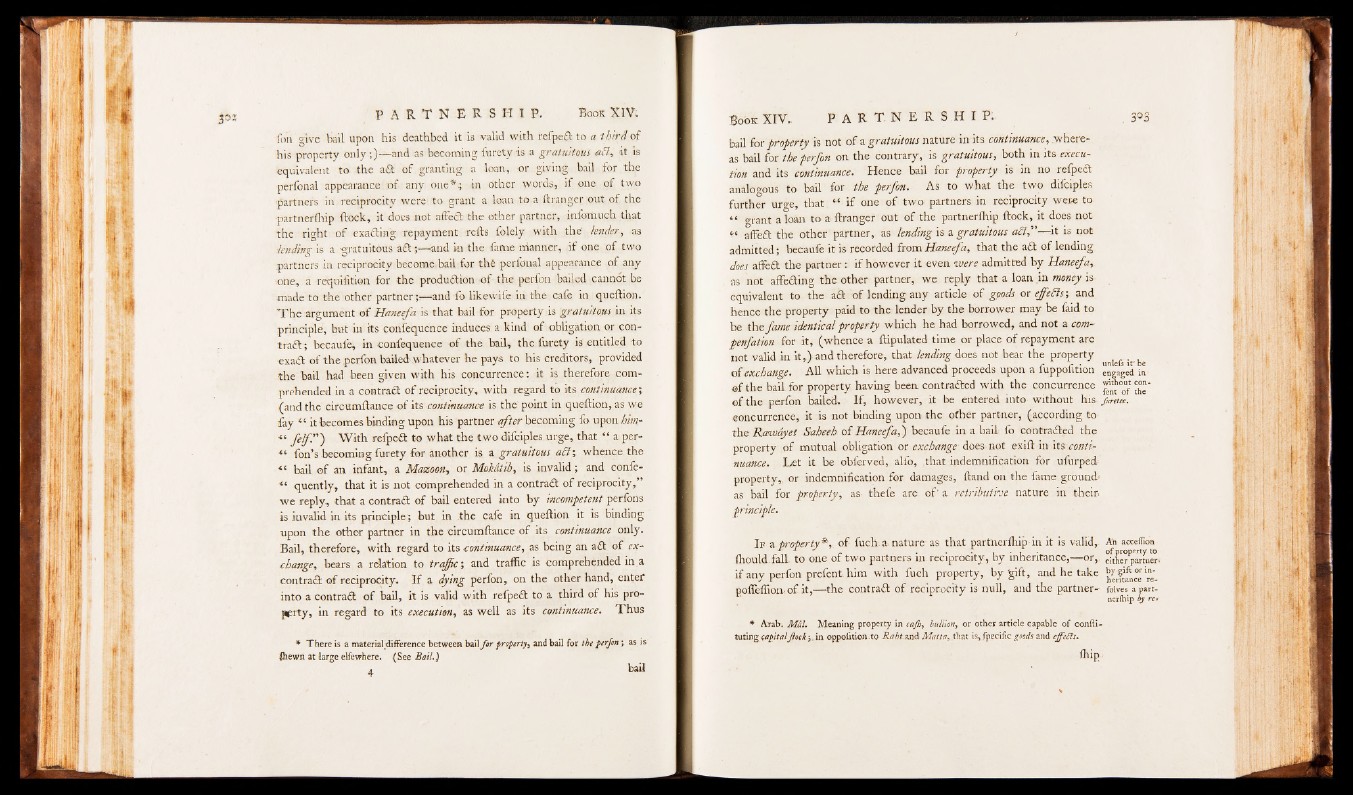
I I I
I I
foil o:ive bail upon his deathbed it is valid with refpedt to a third of
his property only;)— and as becoming furety is a gratuitous a fl, it is
equivalent to the adt of granting a loan, or .giving bail for the
perfonal appearance o f any one*; in other w-ords, if one of two
partners in reciprocity were to grant a loan to a ftranger out of the
partnerfliip flock, it does not affêa the other partner, iiifoiïiuch that
the right of exadling repayment refts folely with the' lender, as
lending is a -gratuitous adt;— and in the fame manner, .if one of two
partners in reciprocity become bail for thé perfonal appearance of any
one, a requ-ifition for the production of the perfon bailed cannot be
made to the other partner;— and fo likewife in the cafe in queflion.
T h e argument of Haneefa is that bail for property is gratuitous in its
principle, but in its confequenee induces a kind of obligation or con-
tradl; becaufe, in confequenee of the bail, the furety is entitled to
■ exadt of the perfon bailed-whatever he pays to his creditors, provided
the bail had been given with his concurrence: it is therefore comprehended
in a contract of reciprocity, with regard to its continuance;
(and the circumflance of its continuance is the'point in queflion, as we
fay “ it becomes binding upon his partner after becoming fo. upon hitn-
fe lf.n) With refpedt to what the two difciples urge, that “ a per-
« fon’ s becoming furety for another is a gratuitous adt; whence the
\ bail of an infant, a Massoon, or Mok&tib, is invalid; and confe-
“ quently, that it is not comprehended in a contradt of reciprocity,”
we reply, that a contradt of bail entered into by incompetent perfons
is invalid in its principle ; but in the cafe in queflion it is binding
upon the other partner in the circumflance of its continuance only.
Bail, therefore, with regard to its continuance, as being an adt of exchange,
bears a relation to traffic; and traffic is comprehended in a
contradt o f reciprocity. If a dying perfon, on the other hand, entef
into a contradt of bail, it is valid with refpedt to a third of his property,
in regard to its execution, as well as its continuance. Thus
* T h e re is a material difference between bail fo r property, and bail for the perfon; as is
fhewn at large elfewhere. (See Bail.)
4 bail
bail for property is not of a gratuitous nature in its continuance, .whereas
bail for the perfon on the contrary, is gratuitous, both in its execution
and its continuance. Hence bail for property is in no refpedt
analogous to bail for the perfon. As to what the two difciples
further uro-e, that “ if one of two partners in reciprocity were to
“ grant a loan to a ftranger out of the partnerfhip flock, it does not
affedt the other partner, as lending is a gratuitous aEl,"— it is not
admitted; becaufe it is recorded from Haneefa, that the adt offending
does affedt the partner: if however it even were admitted by Haneefa,,
as not affedting the other partner, we reply that a loan .in money is
equivalent to the adt of fending any article of goods or effects; and
hence the property paid to the fender by the borrower may be faid to
be the fame identical property which he had borrowed, and not a com-
penfation for it, (whence a ftipulated time or place of repayment are
not valid in it,) and therefore, that lending does not bear the property ^ ^ ^ ^
of exchange. All which is here advanced proceeds upon a fuppofition engaged in-
ef the bail for property having been contradted with the concurrence « B S l |
of the perfon bailed. If, however, it be entered into without his Junta.
concurrence, it is not binding upon the other partner, (according to
the Ranudyet Saheeh of Haneefa,') becaufe in a bail fo contradted the
property .of mutual obligation or exchange does not exift in its continuance.
Let it be obferved, alfo, that indemnification for ufurped-
property,, or indemnification for damages, Hand on the fame ground*
as' bail for property, as. thefe are. of* a. retributive nature in their.
principle.
If a property.* , of fucha. nature as that partnerfhip-in it is valid,. Ah acceflhm
c r y . . . . . . . o f property to
ffiould fall, to one of two partners in. reciprocity, by inheritance,— or,, either partner,
if a n y p e r f o n prefent. him with fuch property, by gift, and he take
poffeffionof it,— the contradt of reciprocity is null, and the partner- foives apartnerlhip
by re*
* Arab. Mai. Meaning property in cajh, bullion, or other article capable o f confti-
tuting (apit a lJlock 3, in oppoiition .to RahtanA Matter, that is, fpecific goods and ejfefts.